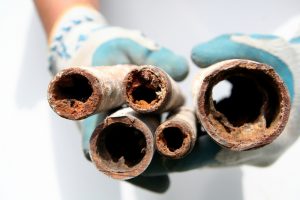Pipe corrosion is a prevalent issue that can severely impact your home’s plumbing system. Pipe corrosion occurs when pipes deteriorate due to chemical reactions between the pipe material and its environment. Let’s explore the various risks associated with pipe corrosion and how to know when to call a professional plumbing company to mitigate them effectively.
Leaks and Water Damage
As pipes corrode, they weaken and can develop holes or cracks, leading to water leaks. These leaks can cause significant water damage to walls, floors, and personal property, resulting in expensive repair bills and disruption to daily activities. In severe cases, homeowners might face the necessity of burst pipe repair in Clive which can be both costly and inconvenient.
Contaminated Water Supply
As pipes degrade, metals such as lead, copper, and iron can leach into the water. Consuming contaminated water poses serious health risks. Ensuring your pipes are in good condition is essential for maintaining a safe and clean water supply.
Reduced Water Flow
Corrosion causes the interior surfaces of pipes to become rough and uneven, leading to the accumulation of mineral deposits and debris. This buildup restricts water flow, resulting in reduced water pressure. It can cause complete blockages, disrupting the water supply and necessitating extensive repairs.
Increased Maintenance and Repair Costs
The presence of corroded pipes in your plumbing system can lead to ongoing maintenance and repair expenses. Regularly addressing leaks, replacing damaged sections, and ensuring water quality requires considerable time and resources. In some instances, severe corrosion might necessitate a complete overhaul of the plumbing system, which is a significant financial investment.
Structural Damage
Corroded pipes can cause substantial structural damage to buildings. Persistent plumbing leaks weaken the structural integrity of walls, floors, and foundations leading to serious safety hazards. This not only compromises the safety of the building but also reduces its overall value. Property owners must be vigilant about pipe maintenance to avoid such costly damages.
Environmental Impact
Leaking pipes due to corrosion contribute to water wastage, exacerbating environmental issues. Water wastage strains local water resources and increases the energy consumption needed for water treatment and distribution. Preventing pipe corrosion plays a critical role in conserving water and promoting environmental sustainability.
Preventing Pipe Corrosion
- Regular Inspections: Routine inspections help identify early signs of corrosion and address them before they escalate.
- Water Treatment: Using water softeners and corrosion inhibitors can reduce the corrosive potential of water.
- Material Selection: Corrosion-resistant materials like PVC, CPVC, or PEX for new installations can prevent corrosion.
- Protective Coatings: Applying protective coatings to metal pipes can shield them from corrosive elements.
- Proper Installation: Ensuring correct installation practices, including avoiding galvanic corrosion by not mixing different metals, is vital.
Pipe corrosion is a serious issue that poses multiple risks to plumbing systems and overall property integrity. Understanding these dangers and taking proactive measures can help maintain a safe, efficient, and long-lasting plumbing system. Regular maintenance, appropriate material choices, and preventive treatments are key to mitigating the risks associated with pipe corrosion.
At Dalton Plumbing, Heating, Cooling, Electric and Fireplaces, Inc., your comfort is our promise! To set up an appointment in the Des Moines area, give us a call at the number above, email customerservice@daltonphc.com or schedule an appointment online.

